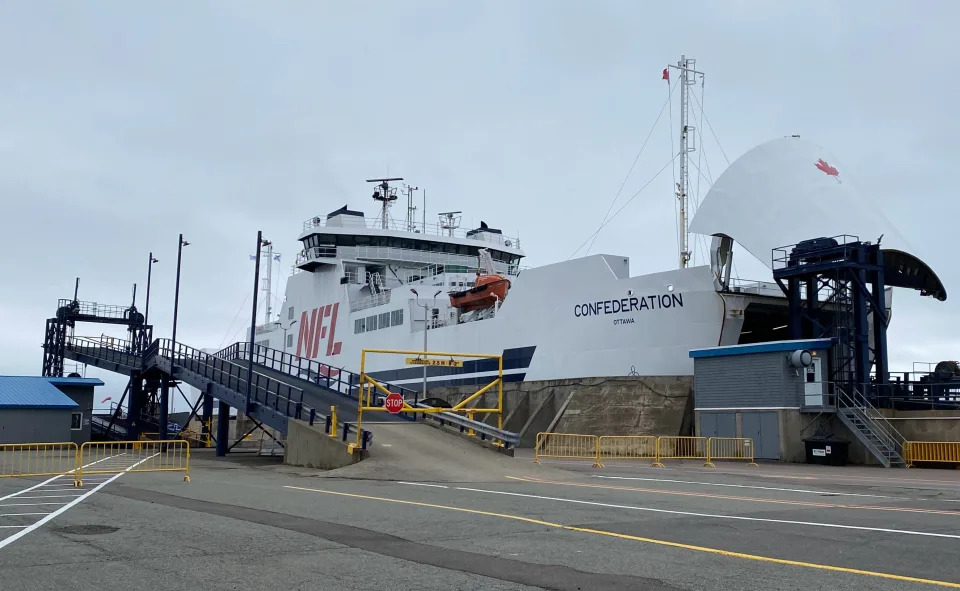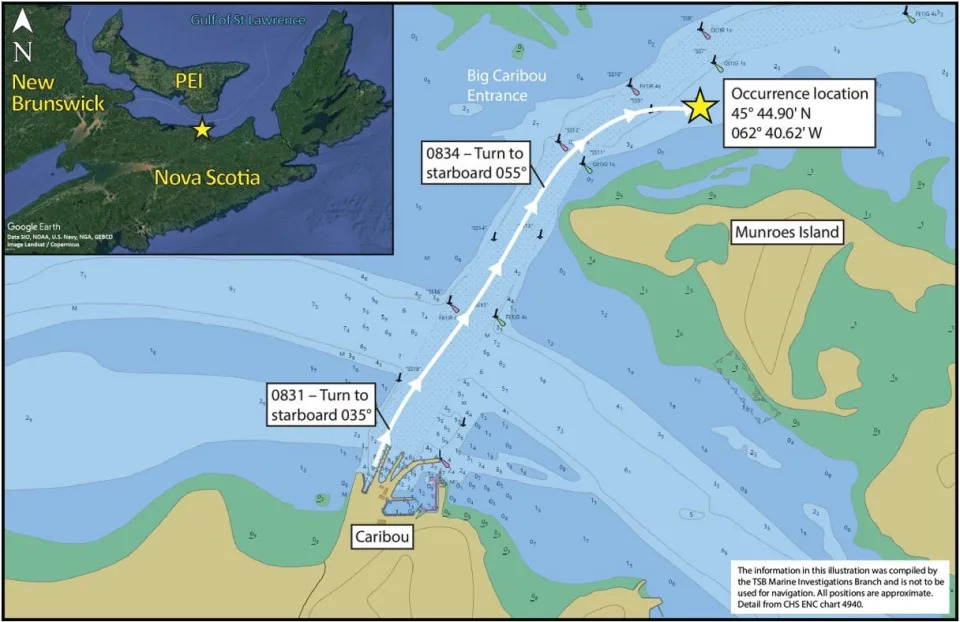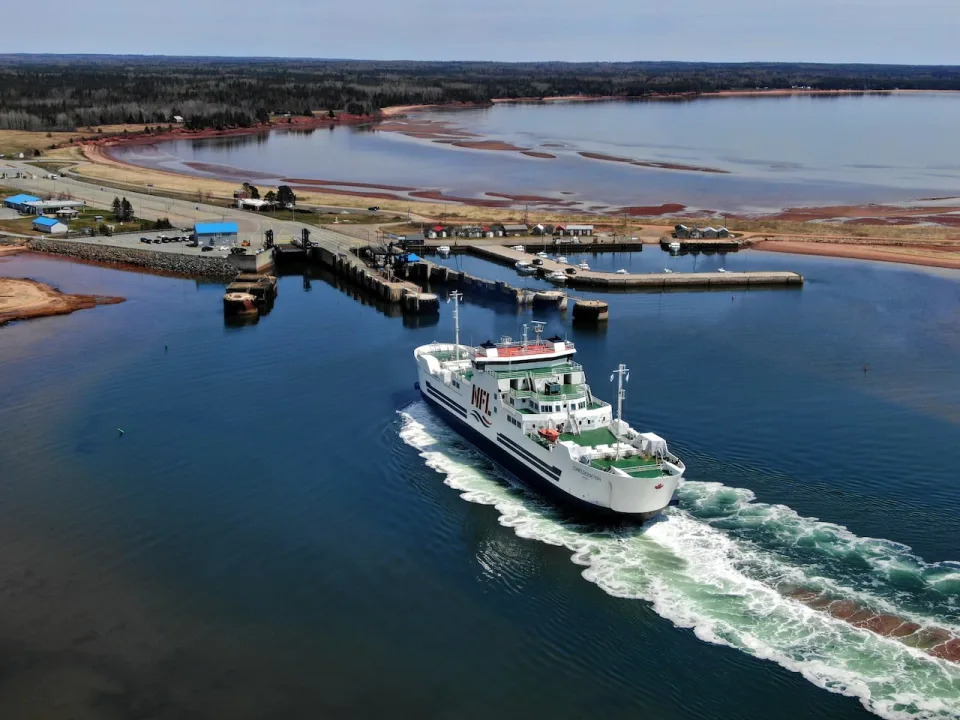CBC
Tue, October 10, 2023

MV Confederation had 217 passengers and 36 crew members on board when its rudder malfunctioned as the ferry left Caribou, N.S., bound for Prince Edward Island on Sept. 4, 2022. (Carolyn Ryan/CBC - image credit)
The Transportation Safety Board of Canada has issued its final report after its investigation of why MV Confederation ran aground last September off Caribou, N.S.
But the biggest mystery remains just that: what caused its rudder to stop responding to the steering system and take the ship starboard (or right) into shallow waters, rather than port (or left) to keep it within the navigable channel between Nova Scotia and Prince Edward Island.
"The investigation determined that, at the time of the occurrence, the steering controls, steering gear, and rudder blade were functioning as designed," said the final report, released Tuesday.
"The TSB was unable to determine why the vessel did not respond to hard-to-port rudder inputs by the quartermaster."
The ferry operator, Northumberland Ferries Ltd., sent a statement to CBC News saying the control system was thoroughly inspected with Transport Canada and Lloyd's Register Classification Society personnel present over the winter, adding: "We have explored all avenues to rule out a re-occurrence."
All circumstances reviewed
The independent investigators at the Transportation Safety Board of Canada get involved whenever there is a safety incident involving a boat or aircraft, as well as occurrences on railroad tracks or involving pipelines.
In this case, the board said there were two things the Northumberland Ferries could have done better the morning of Sept. 4, 2022.

A map provided in the TSB report shows the course MV Confederation took last September before running aground as the tide fell off northern Nova Scotia. (Transportation Safety Board)
The boat's rudder did not work as expected starting at around 8:35 a.m., but the Joint Rescue Co-ordination Centre did not receive a report about the incident until 10:02 a.m. — not from the ship or the ferry company, but "from a concerned third party."
The TSB has reported on a number of recent occurrences in which a delay in reporting an incident affected the response. — Transportation Safety Board of Canada
The report noted: "Early reporting of a potential need for help gives SAR [search and rescue] resources the time to assess the situation and make preliminary and contingency plans.… The TSB has reported on a number of recent occurrences in which a delay in reporting an incident affected the response."
One of those was the 2006 sinking of the ferry Queen of the North in British Columbia, the board's report said.
"Two passengers were unaccounted for and have since been declared dead. During and subsequent to the evacuation, difficulties were encountered in obtaining accurate passenger counts."
"The call from the vessel could have and should have occurred earlier," the statement from Northumberland Ferries said. "It's a learning we have taken very seriously."
As well, the TSB pointed out that the ship's captain had an accurate count of 217 passengers on board, but "NFL shore staff informed the JRCC that the Confederation was carrying 130 passengers and 20 crew members." The ship's master didn't get an accurate count of the 26 crew members on board until nearly three and a half hours after the incident began.
"The Fire and Boat Drills Regulations require that, before a passenger vessel sails, the master is to be provided with the number of persons on board and with details of persons who have declared a need for special care or assistance during an emergency," the report said.
"This will assist the master and crew in responding to an incident and will also help outside agencies with their response."

The MV Confederation is currently the only ferry operating between P.E.I. and Nova Scotia. MV Confederation is shown approaching Wood Islands, P.E.I., in this file photo. (Kevin Baillie)
The Northumberland Ferries statement said ship officials did have an accurate count that day, "but then another source provided different numbers. In hindsight, this led to some unnecessary confusion, which could have been prevented. Regardless, the vessel had an accurate count."
After the ferry grounded, the TSB report noted, two passengers were taken off onto a fishing boat by means of a ladder because they had a flight to catch. The rest stayed on board until the ship could move again with the help of a tugboat's towline as the tide rose, at around 3 p.m., and the vessel arrived back in Caribou for unloading at 4:18 p.m.
The TSB said the ferry company did carry out a number of actions in the months after the incident, including these:
The steering system was examined while it was in dry dock over the winter.
"The company's safety management manual was revised to include an external accident reporting guide," which includes a requirement that the Canadian Coast Guard be notified in an emergency.
Northumberland Ferries brought in more training and a program of periodic drills and exercises.
"This report is a fair and accurate representation of what did and didn't happen on that day," the company statement said. "As a company, NFL welcomes reports such as this and we support and appreciate TSB's goals of improving safety in our industr
No comments:
Post a Comment